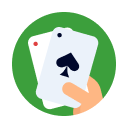S
silversun87
Enthusiast
Silver Level
Hi guys,
I decided recently that I want to learn how improve my poker game so I made a pokerstars account and started playing.
Excluding a few promising results in small stakes tournaments early on I find I'm losing pretty much constantly (especially when it comes to cash games). I always thought of myself of being a reasonably decent player when playing against friends but online it seems it's not the case.
The more I play online the more unsure of myself I start to feel regarding which hands to play and when. I am probably not playing correct hands a lot of the time so I want to ask if you could recommend any resources (books, youtube videos, threads or anything really) to help me get a good understanding of the basics of the game.
Basically I want to understand what hands I should play and how in order to tilt the odds in my favor in the long run. I'm currently playing big hands, pairs and connectors (mostly suited) but I think I'm missing some of the nuances. Sometimes I bluff but I'm not very successful at it. I prefer to play tournaments over cash as I have a somewhat tight style of play. I play for small, no more than a few dollars entry, as that's what I can afford. I try to play every day.
Books I've read in the past are: Doyle Brunson's Super System (which didn't help a lot in terms of play style as he's more of an aggressive cash player), For Richer, For Poorer - Confessions of a Player and I'm currently reading The Mental Game of Poker, Jared Tendler.
Any advice is appreciated
Thanks!
I decided recently that I want to learn how improve my poker game so I made a pokerstars account and started playing.
Excluding a few promising results in small stakes tournaments early on I find I'm losing pretty much constantly (especially when it comes to cash games). I always thought of myself of being a reasonably decent player when playing against friends but online it seems it's not the case.
The more I play online the more unsure of myself I start to feel regarding which hands to play and when. I am probably not playing correct hands a lot of the time so I want to ask if you could recommend any resources (books, youtube videos, threads or anything really) to help me get a good understanding of the basics of the game.
Basically I want to understand what hands I should play and how in order to tilt the odds in my favor in the long run. I'm currently playing big hands, pairs and connectors (mostly suited) but I think I'm missing some of the nuances. Sometimes I bluff but I'm not very successful at it. I prefer to play tournaments over cash as I have a somewhat tight style of play. I play for small, no more than a few dollars entry, as that's what I can afford. I try to play every day.
Books I've read in the past are: Doyle Brunson's Super System (which didn't help a lot in terms of play style as he's more of an aggressive cash player), For Richer, For Poorer - Confessions of a Player and I'm currently reading The Mental Game of Poker, Jared Tendler.
Any advice is appreciated
Thanks!






